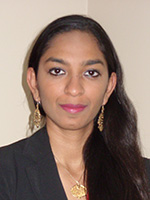Anagha Sundararajan
2020 Temple Bar Scholar Report

When reflecting on my month in England during the Temple Bar Scholarship, two themes carry through my experience. First, learning more about the English common law tradition and observing court proceedings in English courts proceedings challenged assumptions that I did not know that I had about the progress of litigation in a common law court. I of course expected differences in procedural law between the United States and England — after all, the United States is, in many ways unique in its willingness to allow class actions in a broad range contexts and its willingness to allow broad (and eponymously named) “American style” discovery. I was curious to see a legal system which largely disallowed those (to me) fundamental characteristics of American civil litigation, particularly the willingness to allow private litigants to dive into a company’s records in order to prove claims. And, in my week with Quadrant Chambers, I had the opportunity to see first-hand a system that rarely permitted depositions and strictly limited document discovery, while placing a premium on live testimony during trial. During that week, I was able to observe various proceedings in commercial court, including the cross-examination of a named defendant in a trial for breach of contract and breach of fiduciary duty. To me, the experience was eye-opening. Counsel during cross-examination was given significant leeway to explore the factual bases of the claims asserted, the way I would expect counsel to conduct a deposition. Yet the cross-examination was also marked by the kind of adversarial testing that I would expect from a trial. And because civil cases are not decided by a jury, there was less pressure on counsel to focus on a narrow set of clearly-dispositive questions, giving the parties more space to shape a full narrative without the rigidity that comes from having to present a case to twelve laypeople.
What I did not expect, however, how clearly these differences in procedure changed the calculation for litigations at various points in a case about whether and how to proceed. Before going to England, I had naively assumed that, even without broad civil discovery, English civil litigation has the same decision-points as American civil cases — when a complain is filed, the defendant seeks to dismiss; following disclosures, there is something akin to a motion for summary judgment; and finally, if factual issues persist, the case can proceed to trial. At each point, the litigants have to evaluate the cost and likelihood of success, and decide whether and how to move forward. Yet during my week with Jennifer Haywood at Serle Court Chambers, I was lucky enough to get a crash course in English procedure, and, perhaps more importantly, talk through the implications of these procedural difference for litigants. In particular, I was struck by the fact that there is less civil motion practice, with legal issues often being decided along with factual ones around the time of trial. Consequently, English trials tend to be longer and more expansive, and allow counsel to present a complete narrative about both the facts and the law. However, this system can also make it difficult for litigants to gauge the strength of various pieces of their case prior to trial, and can make the process more expensive.
The second theme that stands out in my memory is the incredible generosity that we were shown by every barrister and judge we met. Every person I met was not only willing to answer my (very basic) questions about the English legal system, but was excited to share their experience at the bar and to walk me through some of their most interesting and challenging cases so that fully understand the nuances of English law and the experience of legal practice in England. I was particularly struck by the the warmth and hospitality of the Lord Justices of the UK Supreme Court during our week there, and especially by their willingness to share their impressions of the Court and its cases with us.
I am grateful to the American Inns of Court and COMBAR for giving me the opportunity to learn more about English law and English courts firsthand. In particular, I would like to thank Cindy Dennis for her efforts planning our visit; and thank Lord Burrows, Justice of the Supreme Court and his JA, Anna Brennan; Jennifer Haywood of Serle Court Chambers; Jeremy Richmond QC and Gaurav Sharma of Quadrant Chambers for sharking their knowledge and experience with me. I have learned so much from each of these individuals — and the many other barristers and judges I met in London — that will inform my approach to the law for years to come.
Anagha Sundararajan is a judicial law clerk for Chief Judge Jeffrey Howard of the U.S. Court of Appeals for the First Circuit in Concord, New Hampshire. She previously served as a judicial law clerk for Judge Douglas Woodlock of the U.S. District Court for the District of Massachusetts. As a first-generation American, Sundararajan turned to law not just to help other immigrants but to continue the legacy of her great-grandfather in southern India and the legal practice he built. She earned an undergraduate degree in mathematics and political science with honors from the University of Chicago in 2015 and earned a law degree with honors in 2018 from the University of Chicago Law School. She has extensive pro bono experience, including serving as pro bono counsel with the Domestic and Sexual Violence Project in Chicago, Illinois, and as a pro bono team member for the International Refugee Assistance Project in Chicago.